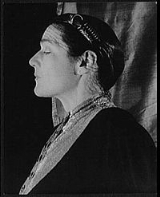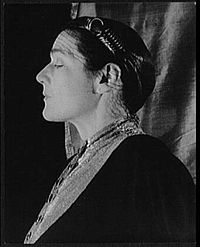
Fannie Hurst
Encyclopedia

United States
The United States of America is a federal constitutional republic comprising fifty states and a federal district...
novel
Novel
A novel is a book of long narrative in literary prose. The genre has historical roots both in the fields of the medieval and early modern romance and in the tradition of the novella. The latter supplied the present generic term in the late 18th century....
ist. Although her books are not well remembered today, during her lifetime some of her more famous novels were Stardust (1919), Lummox (1923), A President is Born (1927), Back Street (1931), and Imitation of Life
Imitation of Life (novel)
Imitation of Life is a popular 1933 novel by Fannie Hurst, which was adapted into two successful films for Universal Pictures: a black-and-white film in 1934, and a color remake in 1959.-Plot summary:...
(1933). Hurst is now best known for the screen adaptations
Film adaptation
Film adaptation is the transfer of a written work to a feature film. It is a type of derivative work.A common form of film adaptation is the use of a novel as the basis of a feature film, but film adaptation includes the use of non-fiction , autobiography, comic book, scripture, plays, and even...
of her works, such as the 1934 film Imitation of Life
Imitation of Life (1934 film)
Imitation of Life is a 1934 American drama film directed by John M. Stahl. The screenplay by William Hurlbut, based on Fannie Hurst's 1933 novel of the same name, was augmented by eight additional uncredited writers, including Preston Sturges and Finley Peter Dunne...
and the 1959 remake
Imitation of Life (1959 film)
Imitation of Life is a 1959 American film directed by Douglas Sirk, produced by Ross Hunter and released by Universal Pictures, starring Lana Turner and John Gavin and features Sandra Dee, Dan O'Herlihy, Susan Kohner, Robert Alda and Juanita Moore as Annie Johnson. Gospel music star Mahalia Jackson...
, based on her novel, which examined race relations.
Biography
Hurst was born in HamiltonHamilton, Ohio
Hamilton is a city in Butler County, southwestern Ohio, United States. The population was 62,447 at the 2010 census. It is the county seat of Butler County. The city is part of the Cincinnati metropolitan area....
, Ohio
Ohio
Ohio is a Midwestern state in the United States. The 34th largest state by area in the U.S.,it is the 7th‑most populous with over 11.5 million residents, containing several major American cities and seven metropolitan areas with populations of 500,000 or more.The state's capital is Columbus...
, the only surviving child of a well-to-do Jewish family. She spent the first twenty years of her life in St. Louis
St. Louis, Missouri
St. Louis is an independent city on the eastern border of Missouri, United States. With a population of 319,294, it was the 58th-largest U.S. city at the 2010 U.S. Census. The Greater St...
, Missouri
Missouri
Missouri is a US state located in the Midwestern United States, bordered by Iowa, Illinois, Kentucky, Tennessee, Arkansas, Oklahoma, Kansas and Nebraska. With a 2010 population of 5,988,927, Missouri is the 18th most populous state in the nation and the fifth most populous in the Midwest. It...
, where she attended Washington University in St. Louis
Washington University in St. Louis
Washington University in St. Louis is a private research university located in suburban St. Louis, Missouri. Founded in 1853, and named for George Washington, the university has students and faculty from all fifty U.S. states and more than 110 nations...
and graduated in 1909. In 1915 she married Jacques S. Danielson of New York, a pianist, but the marriage was not announced until five years later.
In 1921, Hurst was among the first to join the Lucy Stone League
Lucy Stone League
The Lucy Stone League is a women’s rights organization founded in 1921. Its motto is "My name is the symbol of my identity and must not be lost"...
, an organization that fought for women to preserve their maiden names. She was active in the Urban League, and was appointed to the National Advisory Committee to the Works Progress Administration
Works Progress Administration
The Works Progress Administration was the largest and most ambitious New Deal agency, employing millions of unskilled workers to carry out public works projects, including the construction of public buildings and roads, and operated large arts, drama, media, and literacy projects...
in 1940. She was also a delegate to the World Health Organization
World Health Organization
The World Health Organization is a specialized agency of the United Nations that acts as a coordinating authority on international public health. Established on 7 April 1948, with headquarters in Geneva, Switzerland, the agency inherited the mandate and resources of its predecessor, the Health...
in 1952.
When Hurst and Arctic explorer Vilhjalmur Stefansson
Vilhjalmur Stefansson
Vilhjalmur Stefansson was a Canadian Arctic explorer and ethnologist.-Early life:Stefansson, born William Stephenson, was born at Gimli, Manitoba, Canada, in 1879. His parents had emigrated from Iceland to Manitoba two years earlier...
were having a long affair, they often met in New York City
New York City
New York is the most populous city in the United States and the center of the New York Metropolitan Area, one of the most populous metropolitan areas in the world. New York exerts a significant impact upon global commerce, finance, media, art, fashion, research, technology, education, and...
's Greenwich Village
Greenwich Village
Greenwich Village, , , , .in New York often simply called "the Village", is a largely residential neighborhood on the west side of Lower Manhattan in New York City. A large majority of the district is home to upper middle class families...
at Romany Marie
Romany Marie
Marie Marchand , known as Romany Marie, was a Greenwich Village restaurateur who played a key role in bohemianism from the early 1900s through the late 1950s in New York City's Manhattan.- Romany Marie's cafés :...
's café
Café
A café , also spelled cafe, in most countries refers to an establishment which focuses on serving coffee, like an American coffeehouse. In the United States, it may refer to an informal restaurant, offering a range of hot meals and made-to-order sandwiches...
when Stefansson was in town; he was a regular there for many years and a good friend of the proprietor.
Hurst hosted a talk show
Talk show
A talk show or chat show is a television program or radio program where one person discuss various topics put forth by a talk show host....
out of New York called Showcase beginning in 1958. Showcase was notable for presenting several of the earliest well-rounded discussions of homosexuality and was one of the few on which homosexual men spoke for themselves rather than being debated by a panel of "experts". Hurst was praised by early homophile
Homophile
The word homophile is an alternative to the word for homosexual or gay. The homophile movement also refers to the gay rights movement of the 1950s and '60s....
group the Mattachine Society
Mattachine Society
The Mattachine Society, founded in 1950, was one of the earliest homophile organizations in the United States, probably second only to Chicago’s Society for Human Rights . Harry Hay and a group of Los Angeles male friends formed the group to protect and improve the rights of homosexuals...
which invited Hurst to deliver the keynote address at the Society's 1958 convention.
F. Scott Fitzgerald
F. Scott Fitzgerald
Francis Scott Key Fitzgerald was an American author of novels and short stories, whose works are the paradigm writings of the Jazz Age, a term he coined himself. He is widely regarded as one of the greatest American writers of the 20th century. Fitzgerald is considered a member of the "Lost...
presciently described her as one of several authors "not producing among 'em one story or novel that will last 10 years."
Hurst died in 1968, at the age of 78, in New York City. The first full biography of Hurst, by Brooke Kroeger, was published in 1999.
Trivia
The theme song to the 1970 Mel BrooksMel Brooks
Mel Brooks is an American film director, screenwriter, composer, lyricist, comedian, actor and producer. He is best known as a creator of broad film farces and comic parodies. He began his career as a stand-up comic and as a writer for the early TV variety show Your Show of Shows...
comedy The Twelve Chairs
The Twelve Chairs
The Twelve Chairs is a classic satirical novel by the Soviet authors Ilf and Petrov, released in 1928. Its main character Ostap Bender reappears in the book's sequel The Little Golden Calf.-Plot:...
includes the lines:
"Hope for the best, expect the worst.
You could be Tolstoy
Tolstoy
Tolstoy, or Tolstoi is a prominent family of Russian nobility, descending from Andrey Kharitonovich Tolstoy who served under Vasily II of Moscow...
or Fannie Hurst."
Bibliography
Story collections
- Just Around the Corner (1914)
- Every Soul Hath Its Song (1916)
- Gaslight Sonatas (1918)
- Humoresque (1919)
- The Vertical City (1922)
- Song of Life (Knopf, 1927)
- Procession (1929)
- We are Ten (1937)
Novels
- Stardust: The Story of an American Girl (1921)
- Lummox (1923)
- Mannequin (Knopf, 1926)
- Appassionata (Knopf 1926)
- A President is Born (1928)
- Five and Ten (1929)
- Back Street (1931)
- Imitation of Life (1933)
- Anitra's Dance (1934)
- Great Laughter (1936)
- Lonely Parade (1942)
- Hallelujah (1944)
- The Hands of Veronica (1947)
- Anywoman (1950)
- The Man with One Head (1951)
- Family! (1960)
- God Must Be Sad (1961)
- Fool, Be Still (1964)
External links
- The Fannie Hurst Papers at Washington University in St. Louis
- Fannie Hurst, Women's History Profile at About.com

